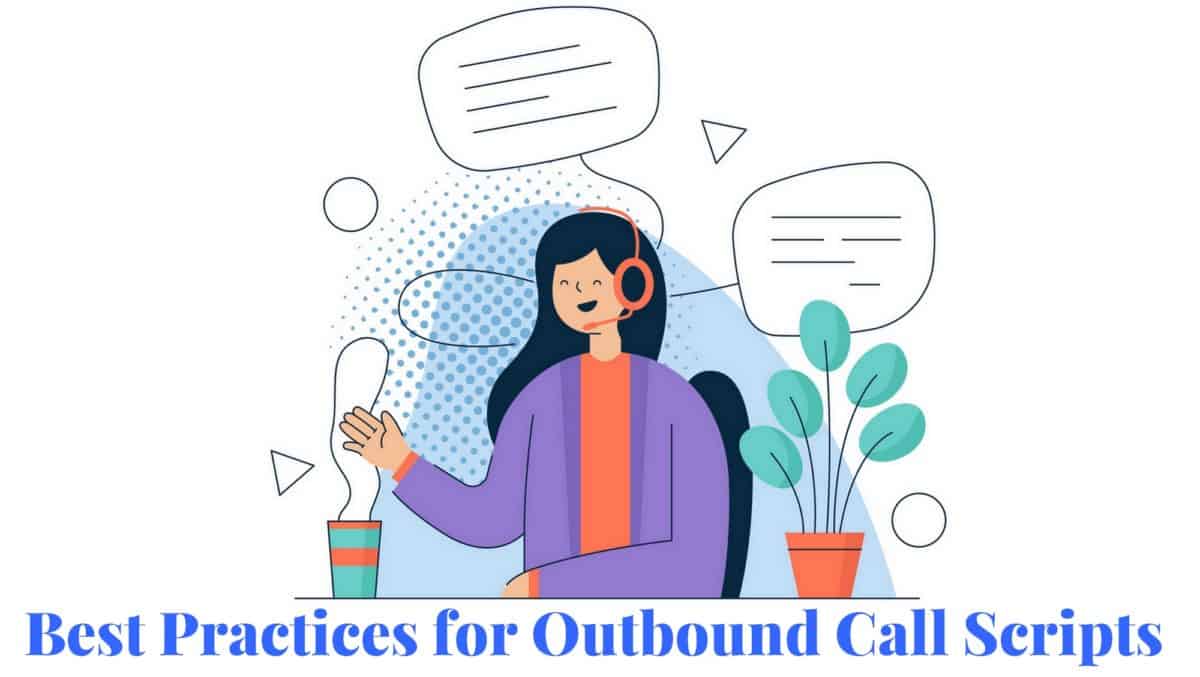No matter the business objectives of a brand. To this day, phoning remains the most efficient to contact and reach potential customers.
For contact centers, it’s easier said than done! Outbound call campaigns represent a tedious strategy in terms of resources, process, and technology. The first step toward running a successful campaign starts with creating a good outbound call script.
The purpose behind outbound call scripts
No matter who your prospects really are, one thing is certain. They are always busy, and even if they agree to talk to your agents from the start. They will always impose a time limit. Hence the need for an outbound call script that follows certain golden rules.
So once the prospect picks up the phone, your team must be able to provide information quickly and fluidly. In particular, prospects need to know :
- Who you are?
- What is the purpose of the call?
- Why might they be interested in your product or service?
- What do you expect from them?
What are the golden rules of a good outbound script?
Rule #1: The agent must introduce himself and ask if the prospect is available.
Indeed, outbound scripts must allow an agent to introduce himself, talk about the business, and answer all the above-mentioned questions. However, even if the ultimate goal is to get that Yes from prospects. It is not advisable to put pressure on them.
If they mention more than once that they are not available at the moment. Your agent should propose a more suitable time to schedule a callback.
Rule #2: Getting the prospect’s attention
A good script captures the prospect’s interest in less than 15 seconds. In other words, your team must convey the value of your proposal and prove that your offer is beneficial to them.
It’s not as easy as it sounds. Catchphrases in the script must have an impact and attract attention. Most call centers don’t get it right from the get-go. This is why it’s important to alternate, test, and modify scripts as your campaign unfolds.
Rule #3: Accept the “No”
If everyone said yes to an offer, there would be no outbound call campaign! Even if you use the best approach and strategy., some prospects may simply be indifferent to your proposal.
Getting a no over the phone may be a blow to your team’s morale, but it’s part of the game. Hence the need to implement a winning mentality among your outbound platform. Each agent should argue, persist, and turn objections into opportunities. This can be done through a complete script that takes into account all forms of rejections.
How does a call script improve your outbound strategy?
Ask the most experienced sales agents if they like working with a script. A large majority will tell you that they prefer to have some freedom and autonomy. They will add that designing a script and sales pitch is tedious, boring, and involves too much structuring and editing.
In reality, scripts allow you to build an organized and engaging interaction with your targets. Also, the agent can talk about every key element of your product or service without getting lost in the conversation or losing precious time.
On the other hand and contrary to popular belief, a script is not some kind of dictation that agents have to recite word for word. This is a key part of your campaign and it must be modified as you go along. That’s why it’s useful to have an editable script that can be continually reviewed and improved as your product or service changes.
What are the metrics to follow?
Business in call centers is about purpose, growth, and numbers. Thus, an outbound call campaign must be considered a permanent process. If you want to target your prospects better while being more efficient. You ought to consider what comes after the end of the script, key performance indicators.
Between each stage of your campaign’s progress, you should assess your performance. Here are the most crucial metrics to monitor.
Qualification rate
This KPI gives you an idea of your agent’s ability to organize their outbound calls. It tells you if they are addressing the right targets and whether the scripts are working or not. To calculate it :
Qualification rate = number of calls made/Number of targets in the prospect file
The ratio should be at least 5 to 10%. If not, you should review the call script and sales pitch for your agents. In some cases, a low qualification rate can also be an indicator of a poor-quality prospect file.
Conversion rate
This is the most popular KPI for outbound call campaigns. Conversion rate gives you an idea about your team’s ability to convince and answer the concerns of your prospects.
Conversion rate = (Number of sales made/Number of appointments granted) x 100
More precisely, this rate allows judging your team’s capacity to negotiate and persuade prospects of your offer. But this number is very volatile because it depends on several factors, namely :
- The attractiveness of what you offer,
- Nature of the campaign: B2C or B2B
- The commercial ability of your team,
- Your team’s ability to handle refusals.
Nevertheless, good agents can close about 10 sales out of a hundred qualified customers. As for the script, you shouldn’t lie about your offer naturally. But you can boost the conversation rate by emphasizing the benefits you offer rather than features.
Efficiency rate
This KPI is typically used for outbound appointment scheduling campaigns. It allows you to evaluate the ability of your agents to generate interest in a few sentences from a script. Again, this one also depends on the nature of the campaign, quality of the prospect file, and targets.
Effectiveness rate = number of appointments obtained and honored/number of calls made for an appointment granted
Alternatives to scripts
Callbots
Callbots can be integrated within your platform, automatically call prospects, and complement the work of your team. Using artificial intelligence, this technology can filter and qualify customers through pre-set phone scripts. Some of them can even learn by themselves through a process called machine learning.
Callbots also have the ability to analyze and understand the words of prospects. This feature is speech recognition through semantic analysis. Once the prospect’s words are understood, Callbots provide consistent answers to their requests.
However, this technology has its own limitations. In particular, the fact that it can only take first-level questions and it doesn’t process familiar language.
Voice mail
You will not always be able to reach your prospects. For example, they may be in a meeting, on the road, or simply concentrating on their work when you call them. But that doesn’t stop you from reaching them. So what do you do when you get voice mail?
You can set up a second script to leave a voicemail message that can be easily understood. A short message that goes straight to the point and quickly explains to prospects what to do in case they are interested in your offer.
Having the will to apply good practices in the contact center field is one thing, but applying them is another. If you want to be proactive and always stay one step ahead of the competition, you need to use a powerful technology such as OMNI+ from NobelBiz. A solution that allows you to modify your script, navigate between communication channels, and use your CRM efficiently.
Conclusion: stay positive!
Words carry weight! A good outbound script will help you set up a positive and engaging conversation. Don’t forget that the words you use must be well thought out and, above all, positive. Even with the right approach, negative words will always have a bad impact on your agent-client conversation.
If you know how to choose the right words, they will make your scripts more effective and help you gain the trust of your prospects. Customize it according to your target and continue to adjust it so that it evolves over time and gradually brings better results.

Michael McGuire is a contact center industry expert with almost two decades of experience in the space. His experience includes roles as Director of Contact Center Digital Transformation at NobelBiz, and as Director of Operations at FLS Connect, managing multiple call centers. As President of Anomaly Squared and Targeted Metrics, Michael successfully transitioned companies into remote operations and significantly boosted revenues. With a strong background in customer service, leadership, strategic planning, and operations management, Michael excels in driving growth and innovation in the call center space.
Mike is also a proud Board Member for R.E.A.C.H Trade Group, promoting consumer protection and satisfaction and Co-host of the Off Skripted Podcast – a show about Life, Call Centers and everything in between.







